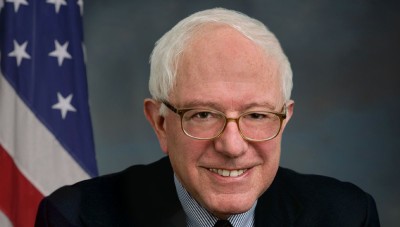
Bernie Sanders has won the Democratic caucuses in Maine, scoring a needed victory in the northeastern US state for his challenge to Hillary Clinton for their party’s presidential nomination.
With more than 90 percent of precincts reporting on Sunday, Sanders led Clinton with 64.3 percent of the vote compared to her 35.5 percent.
A victory along those lines would see him take most of the state’s 25 convention delegates at stake.
It was an expected win for Sanders, who enjoys strong backing in the northeastern US region and hails from nearby Vermont.
“I thank the people of Maine for their strong support,” his campaign said in a statement.
“With another double-digit victory, we have now won by wide margins in states from New England to the Rocky Mountains and from the Midwest to the Great Plains.”
The win came as the two Democratic presidential contenders squared off in a debate in Michigan on Sunday, where they clashed angrily over trade, the car industry bailout and Wall Street.
Al Jazeera’s Kimberly Halkett, reporting from Washington, said Sanders “came out sparring” on a number of issues.
“He also reminded the audience that there is a key philosophical difference between himself and Hillary Clinton – their ties to Wall Street,” Halkett said.
READ MORE: Super Saturday – A nightmare for the Republicans?
In the debate, held in Flint, Michigan, Sanders said Clinton supported “disastrous” trade policies that moved manufacturing jobs out of cities such as Flint and Detroit and shifted them overseas.
But Clinton said Sanders’ opposition to the 2009 auto bailout, a crucial issue in a state that is home to the US car industry, would have cost Michigan millions of jobs. The bailout, which Clinton supported, passed Congress and has been credited with helping save the US auto industry.
“If everybody had voted the way he did, I believe the auto industry would have collapsed, taking four million jobs with it,” Clinton, the former secretary of state, said of Sanders.
The debate was held in Flint to highlight the city’s water contamination crisis, and both candidates expressed outrage at Flint’s plight and demanded state and federal money begin to flow immediately to begin relief and rebuilding efforts.
Sanders has struggled to slow Clinton’s march to the nomination to face the Republican candidate in the November 8 general election to succeed President Barack Obama.
Sanders also questioned the sincerity of Clinton’s conversion to opposing the Trans-Pacific Partnership, a proposed 12-nation Pacific Rim trade deal.
Al Jazeera’s comprehensive coverage of the US presidential election campaign
The two contenders cut each other off on several occasions, a rare occurrence in a race that has been much more polite than the raucous Republican presidential campaign.
Sanders repeated his charge that Clinton is too close to Wall Street and demanded again that she release the transcript of paid speeches she has given to Wall Street firms.
Opinion polls show Clinton, 68, leading in Michigan and Mississippi, which vote on Tuesday. She also leads in polls in several big states that vote on March 15, including Ohio and Florida.
Sanders, 74, faces a tough challenge erasing Clinton’s lead of about 200 bound delegates who will choose the nominee at the July convention. Since the Democratic race awards delegates in each state proportionally, she will keep gathering delegates even in those states she loses.
The Democratic debate occurred one day after Sanders won nominating contests in Kansas and Nebraska, and Clinton won the bigger prize of Louisiana, a win that allowed her to slightly expand her delegate lead.
END

Be the first to comment